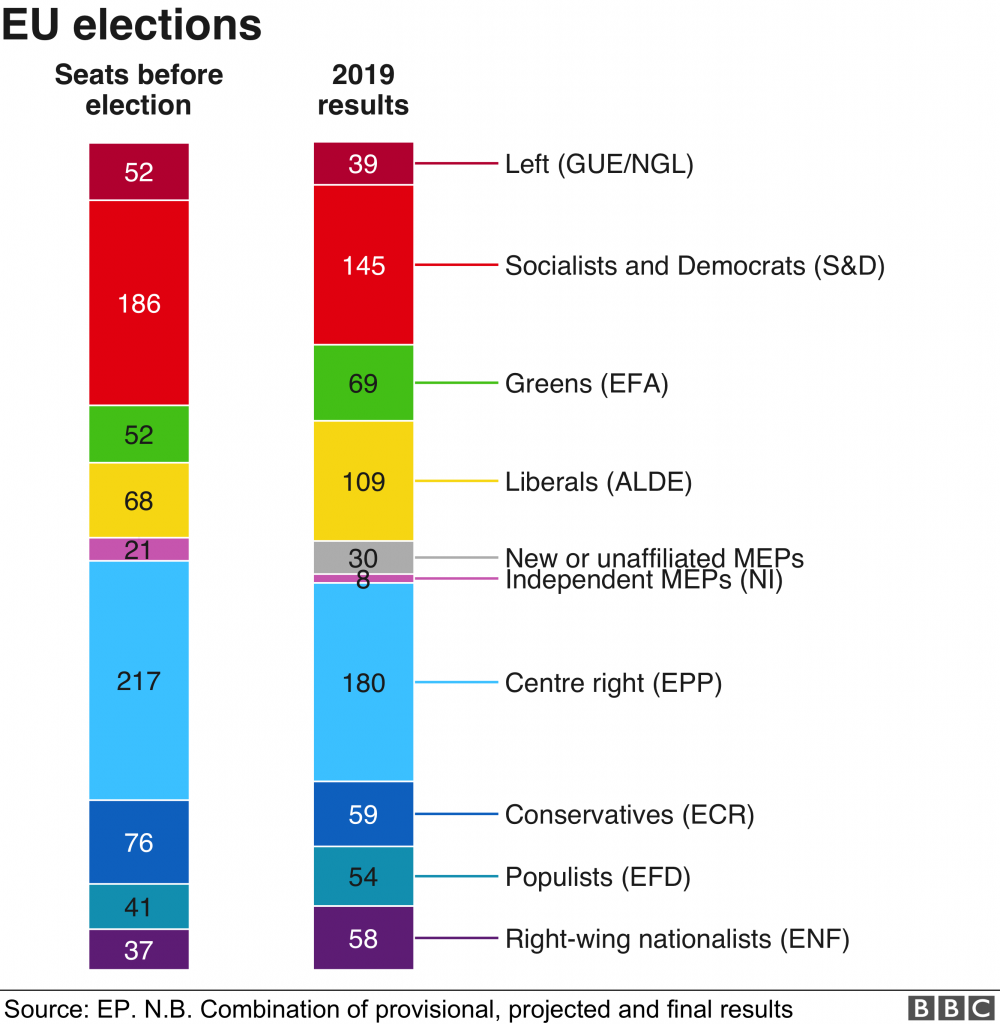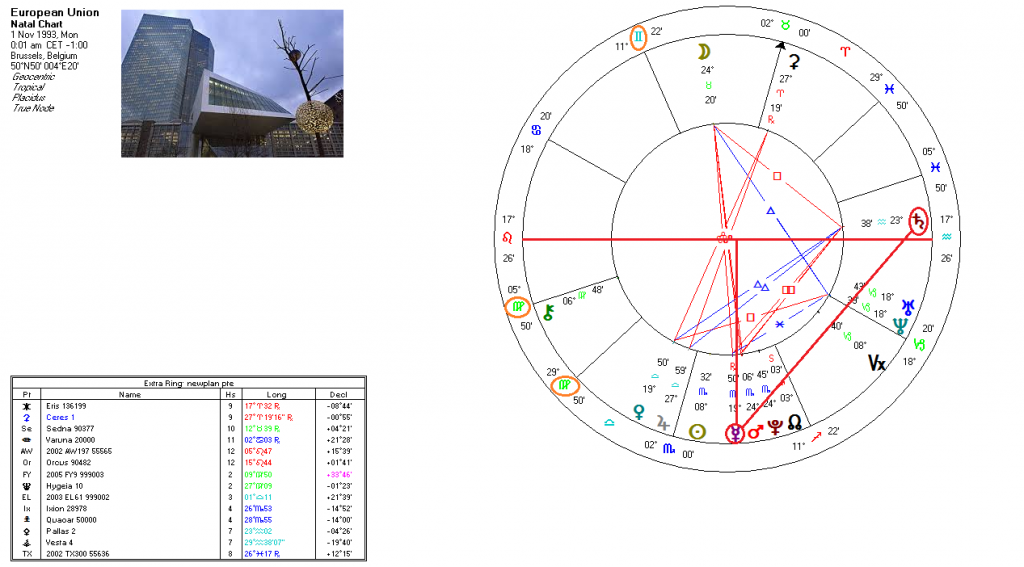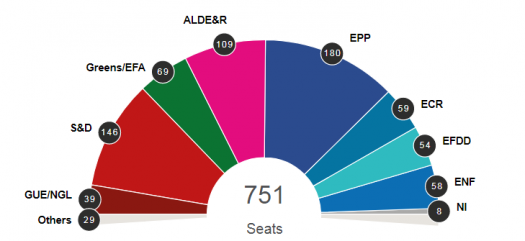Europe went to the polls over the weekend to cast its votes for the European Parliament. In our preview of the elections, upsets were in the wind, and that is exactly what took place. But it was not in the way that many commentators expected – with a surge of the far-right that seeks to break up the EU. As expected, the populist/nationalists in the UK, Italy and Hungary did well. But the real upsets came from other nations. We’ll get to all that in a bit.
As it stands now, the biggest message that European voters sent was that the establishment parties in Europe are on notice, and that they are not serving the interests of the people. The two biggest party blocs in the past – the S&D (Socialists and Democrats) and the Centre Right (EPP) – lost their majority, and for the first time in 40 years. That was probably the most significant upset. That 40-year figure is important, too, because it represents the approximate timing of the introduction of the neo-liberal economic system into Europe, upon which the financial system in the EU is based.
But as to the spectrum of change within the vote, on the left, the Greens and the ALDE made the greatest gains, while the S&D parties lost the most. On the right the populists and nationalist parties made the biggest gains, while the Center Right and Conservatives lost the most seats. The graphic below tells the story:

The most dramatic shifts to the right came in the UK, Hungary and Italy. But from the graph, we see that those gains did not make that big of a dent in the overall picture. Conservatives and Labor in the UK were trounced, due to their floundering on the Brexit question. Farage’s Brexit party won the largest number of seats, with the Liberal Democrats coming second. We will treat the British results in a separate article. Lega Nord in Italy made the greatest gains there, as expected. But less expected was that the Partito Democratico (center left) came in second. The latter was Matteo Renzi’s party, which lost at the last Italian election. The Five Star Movement took a beating, winning only half of the seats as that of the Lega. So, for the moment in Italy, Matteo Salvini is the clear leader in Italian politics. However, Silvio Berlusconi actually won a seat in the EU Parliament, for the Forza Italia Party. Bunga Bunga!
The other message that was sent was that the pro-EU parties in Europe are still in the majority, and widely so. The so-called far right parties did not make the gains that doom-sayers had forecast. In fact, there is a pretty fair balance between the ‘left’ and the ‘right’. Instead, there was a surge in fringe parties like the Greens and environmentalists, whose parties did exceedingly well, those being left-leaning for the most part. We saw that especially in Ireland for instance, where the Virgo soul for that nation made its presence pronounced.
But there was also another message, hidden among the others. Voter turnout was just over 50%, on average, which was a trend upwards. Voter turnout in previous EU elections had been falling, reflecting voter apathy. Voter turnout in the UK was among the lowest at roughly 37%, probably reflecting the lack of enthusiasm there for the EU. But then, UK participation in EU elections has always been low. The message on the whole, throughout Europe, is that people in the EU are taking notice of the way things are going, and they want to see a change away from austerity and definitely want changes to immigration policies.
To summarize the surprise results in the elections, then, in the Emerald Isle there was said to be a ‘green wave’, with voters there expressing their concerns over the environment. The Dutch gave a rebuke to populists, with the Dutch Labour Party winning the majority. The Austrians are now facing new elections with the collapse of the ruling right-wing coalition. And probably one of the most stinging rebukes was to that of Macron in France, who lost the election to Marine Le Pen, even though his En Marche Party joined the liberal Euro-centrist ALDE parties, which will counterbalance the gains made by the Euro-skeptic parties.
What all this means is that Europe is changing direction. Support for the EU is stronger than many pundits had thought. The far right is not taking over Europe. The neo-liberal economic model is not going to go away quietly, either. But it will be harder to govern in Europe now. Instead of two major blocs being able to control the course of events as we have seen in the past decades, now coalitions with minor parties will have to be struck. Debate will be on the increase, and such debate is badly needed in the EU, so long as it does not devolve into rank partisanship. In all, it has been a good proving of the working chart for the EU, which shows in the directions and transits as we saw in the overview.
Before the elections, much was made of the far right parties and the gains they were likely to have made in the elections, a lot of that reporting being scaremongering. That may have had an influence on the voters as they went to the polls. But in all, those parties comprise around 200 seats out of the 751, and they are deeply divided over issues like immigration quotas, sanctions against Russia and so forth. They are not the sort of voting bloc one would see in the two blocs that used to hold power. But then, the establishment parties should not be too confident that the nationalist/populist parties can be effectively contained and sidelined. As was stated, Europe is changing direction. It has been best summarized in the following:
“…Macron, like mainstream politicians elsewhere, will now need to show he grasps the deep frustrations felt by Europeans living not in the glittering capitals, but in provincial areas severely hard-hit by stagnant or declining growth, and the disappearance of industrial jobs. “You have everywhere in Europe, and I would say everywhere in the Western world, a split between two parts of the nations,” French Finance Minister Bruno Le Maire told TIME earlier this year, as the E.U. campaign took off. “One part is benefiting from globalizing, and the other part is suffering from globalization.”
That is pretty much the story across the Western world. For the past 40 years, especially, the disappearance of industrial jobs to Asian economies has accelerated. Fingers are pointed at nations like China for “taking our jobs”, as the refrain is often heard. But the fact is, China only did what came naturally, and the corporatists in the West happily sent those jobs overseas. China happily took them, and then ran with them, building their economy as a result. The Chinese are not the ones to blame. The blame starts at home. This is what people are realizing now. Leaders like Salvini echo a truth that the Chinese, for instance, have demonstrated: Nations must produce themselves to prosperity. If this is not addressed and the rural sectors of previously industrialized nations are not re-tooled (i.e. meaningful jobs are created) over the next five years, the populists/nationalists will have a field day at the next elections.
Europeans have demonstrated they do not wish for a return of fascism, nor do they want the far right to dominate. That was clear at this point in the elections. But unless real change comes to EU policy, instead of window dressing, the populists are not going away. It is doubtful we will see much change, though, because the entrenched politicians at the top do not listen to the people below them, nor do they believe that the people are correct. Until they are unseated, nothing much will change.
France, the UK and Italy are the three nations to watch very closely in the next years. Austerity measures and extreme capitalism, which are policy among ALDE parties, for instance, breed populism and nationalism. We will have to watch those three nations especially regarding the Eurozone. The fact that Salvini is gaining in prominence in Italy, that Macron is losing in France, that the Brexit Party did so well, point to the effects of the current EU Eurozone policies. The UK is a special case when it comes to Europe, though, because London is the beating heart of the neo-liberal system, along with the US. The so-called populists/nationalists there, like Nigel Farage, are in reality die-hard neo-liberalist/Libertarian and anti-EU.
In many ways, this election was a referendum on finances and the economy. The banking/finance sector is the Achilles heel of the EU. It is ruled by Mercury, is not well aspected – in fact is quite stressed – and squares the horizon of the EU chart (below, bigger):

That placement of Mercury reflects much of what has happened in the EU, especially since the 2008 financial crisis. The austerity measures are shown in the square to Saturn. Losses are shown in the same, along with the Uranus/Neptune conjunction, even though it is sextile to Mercury. But that conjunction is also square to Venus, showing in one respect relationships that are not pinned to realities, the voicing of high ideals which often do not work out into facts on the ground, and peculiar or one-sided relationships that exist within the Union. Neptune rules the 8th house of international finance, but also losses. The Saturn reflects the slow, sluggish and sometimes non-existent recovery since the crisis and a lack of imagination in ways of resolving it. With the sextile to the Uranus/Neptune conjunction the capacity is there, though, for some real imaginative solutions. And lastly, Mercury rules the 2nd (banking), 3rd (commerce) and 11th (intra-union relationships).
There is a clear warning in the preceding. If nothing changes markedly in the economic sphere in the next years, the next election will see an earthquake go through the EU, going all the way to the top, with quite significant changes to the banking and financial sectors probably coming to pass. This is shown by a direction of the Uranus/Neptune conjunction square to the EU Mercury at the time of the next election in 2024. The populists and nationalists will be making a very pronounced change in the union if that is the case.
Unless Italy is allowed leeway with its finances there will be significant trouble for the EU. Salvini, with his growing support, will be in a better position to influence the Italian public, and he holds sway in the industrial north of Italy, the most powerful part of the nation. The rural south is still in line with the Five Star Movement. But that can change quickly if financial concerns get worse.
And then, we cannot ignore the influence of an increasingly belligerent and uneasy US, with the EU being a project that has ‘America’ stamped all over it. ‘The United States of Europe’, with things going as they are, will not eventuate, as much as leaders like Macron would like to see it. People are losing their taste for greater integration. What they want is freedom to forge their own destinies as nations. Europe is not a homogenous construct like the US. Its cultures are diverse, as are the needs of its nations. And the more Washington tries to force its desires on Europeans, the greater will be the splits among the establishment parties in the EU.
Then, there is the growing reality within Europe that Europeans must have a constructive relationship with the Russian government. Europe needs the Russian resources, especially it energy resources and Russians are primarily European. This will only inflame tensions with Washington and factions in London. And then there are the inroads China is making with its Belt and Road Initiative, again inflaming tensions with Washington. But the writing is on the wall for more forward thinking Europeans on all sides. Europe is a natural partner with Russia and is part of the largest land mass on the planet. It is only a matter of time before European and Asian nations are cooperating much more closely than they are now. The situation in Europe is indeed changing very rapidly.
These next years are crucial if the EU is to survive as a union with its present member states. The needed changes are there for all to see, but the question on people’s minds is whether or not there is the political will. Progressives must organize and find their voice again, abandoning the neo-liberal programs they had embraced. Austerity must be abandoned and investment in industry and infrastructure restored. The promise is there, but from what we see here, this looks more like a transitional Parliament than one that will make the needed changes. That may have to wait another five years. But there are strong stirrings of public discontent with the status quo, enough that perhaps with Uranus transiting over the 10th house for the next 10 years, the establishment in the EU will have to wake up and smell the Italian espresso, or the French roast in the immediate future.
As for the UK, we’ll have to wait and see there. Will the UK stay and help remake the Union, or will they drift toward becoming the 51st US state? That will be the next article, because very great changes are coming for the UK as well, and its people are among some of the most disaffected in the EU.
Featured image from EU Parliament site.

